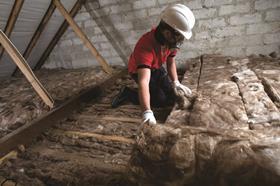Industry bodies call for government to make retrofit a national infrastructure priority and invest up to £4bn per year in improving aging housing stock

Improving the energy efficiency of UK homes should be national infrastructure priority, with the government committing to retrofit a million homes a year by 2020, a major new industry coalition has urged.
In an open letter to infrastructure minister Lord Deighton (published below), 20 organisations from the construction, housing and environment sectors have today called for the government to invest up £3-4bn per year to fund a significant programme of energy efficiency to transform the UK’s aging housing stock.
Boosting capital spending on retrofit is a key aim of Building’s Green for Growth campaign.
The heads of the environmental groups, charities, membership organisations and trade associations, including UK the Green Building Council (UKGBC), the Association for the Conservation of Energy, and the Federation of Master Builders (full list below), warn that the UK’s homes are among the “coldest and draughtiest in Europe”, which results in high energy bills and “one of the worst records on fuel poverty and preventable winter deaths”.

The coalition of organisations says investment in retrofitting the UK’s housing stock would address market failures and leverage substantial additional private investment.
The open letter reads: “Domestic energy efficiency is one of the most cost effective ways to achieve the Government’s three strategic priorities for energy infrastructure: controlling energy bills, tackling climate change and unlocking investment to support economic growth.”
“No other investment can achieve so much for individual householders and for UK Plc.”
The letter comes as the group of organisations publishes a short report, setting out the strong economic benefits for improving home energy efficiency. These include:
- Generating significant economic growth and doubling the number of jobs in the energy efficiency sector to 260,000.
- Improving energy security and reducing the UK’s reliance on imported gas.
- Reducing carbon emissions to meet carbon targets and combat climate change.
- Permanently reducing energy bills by £300 a year and lifting nine out of 10 homes out of fuel poverty.
- Improving health and wellbeing, reducing excess winter deaths and lowering NHS and social care costs.
Speaking on behalf of the coalition, UKGBC chief executive Paul King, said the UK’s aging housing stock represented a “gaping hole at the heart of the government’s plan for infrastructure”.
He added: “The government has so far failed to recognise the huge opportunities it presents.
“But it’s not too late. Making home energy efficiency a national infrastructure priority - and offering it significant support alongside transport, energy generation or communications projects - would not only cut households’ rocketing energy bills and help tackle climate change, but would create thousands of new jobs and strengthen the UK’s energy security.
“Government spends £45bn a year on capital infrastructure investment - our bricks and mortar deserve to be included”
Text of letter in full

Dear Lord Deighton
The UK’s 26 million homes should be fit for the future. Our homes are among the coldest and draughtiest in Europe. As a result we have high energy bills and one of the worst records on fuel poverty and preventable winter deaths. We are also wasting vast amounts of energy and increasing our reliance on expensive fossil fuels.
Rising energy bills and safeguarding energy security will be key issues for the General Election in 2015 but they will not be solved overnight. We need a long term plan to transform the energy efficiency of our homes, within a generation.
We are calling on all the government to:
- Make home energy efficiency a top infrastructure priority
- Support investment with a long term revenue stream
- Achieve 1 million deep retrofits each year by 2020
Overhauling the energy efficiency of our existing homes will be a challenge, but one that offers huge opportunities. Improving our existing homes will stimulate economic growth and create thousands of jobs spread across the country. It is the most cost-effective way to slash our carbon emissions and aid the transition to cleaner sources of energy. No other investment can achieve so much for individual householders and for UK Plc:
- Generate significant economic growth in all regions of the UK and double the number of jobs in the sector to 260,000 jobs.
- Improve the UK’s energy security and reduce our reliance on imported gas.
- Reduce carbon emissions to meet carbon targets and combat climate change.
- Permanently reduce energy bills by £300 and lift 9 out of 10 homes out of fuel poverty.
- Improve health and wellbeing, reduce excess winter deaths and lower NHS and social care costs
An issue of such significance must be regarded as a national infrastructure priority. The National Infrastructure Plan recognises that markets need support to deliver projects of national importance, and this is clearly true for home energy efficiency.
There is a key role that Government can play in creating the right conditions for a flourishing market. Firstly, Government can provide an overarching strategy, to give confidence to investors in the infrastructure pipeline and help facilitate a clear delivery plan. Secondly, there are projects where it is essential Government capital spending is used to overcome barriers to delivery. A significant programme of energy efficiency would need public investment of £3-4 billion a year to address areas of market failures and leverage substantial additional private investment.
Domestic energy efficiency is one of the most cost effective ways to achieve the Government’s three strategic priorities for energy infrastructure: controlling energy bills, tackling climate change and unlocking investment to support economic growth. It is the only way to permanently reduce energy bills, it reduces the cost of decarbonising generation and it creates jobs in every constituency in the UK.
We would welcome a meeting with you to discuss these points in more detail.
Yours sincerely -
Signed by:
- Aldersgate Group
- Association for the Conservation of Energy
- BioRegional
- Cavity Insulation Guarantee Agency
- Centre of Refurbishment Excellence
- Energy Bill Revolution
- Energy Saving Trust
- Federation of Master Builders
- Forum for the Future
- Friends of the Earth
- Green Alliance
- Greenpeace
- National Energy Action
- National Energy Foundation
- National Housing Federation
- National Insulation Association
- SHIFT - Sustainable Homes Index For Tomorrow
- Sustainable Energy Association
- UK Green Building Council
- WWF-UK




























No comments yet